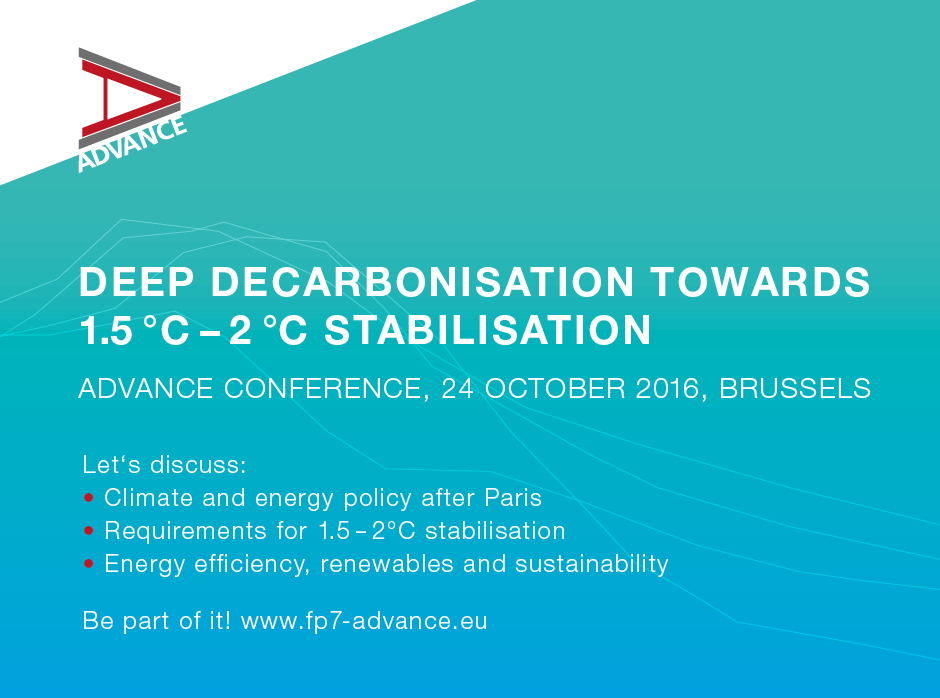News
Nature Climate Change publishes ADVANCE results on sensitivity of long term CO2 emissions
ADVANCE researchers decomposed the sensitivity of future long term CO2 emissions to their major drivers: population, income, energy intensity, fossil resources availability, and low carbon technologies development.
The results of this research are now presented in the article "Sensitivity of projected long term CO2 emissions across the Shared Socioeconomic Pathways” published in Nature Climate Change. They show that economic growth and energy intensity are the most important determinants of future CO2 emission across different socio-economic pathways. Projected population seems to matter less in determining future emissions. Fossil fuel and low carbon resources rank in between. Also, results show that the different drivers interact: for example a richer world will lead to lower emission increase if it is a sustainable one, and vice versa.
The article is authored by researchers from the following institutions: Fondazione Eni Enrico Mattei (FEEM), Politecnico di Milano, Bocconi University, National Technical University of Athens, International Institute for Applied Systems Analysis (IIASA), PBL Netherlands Environmental Assessment Agency, Utrecht University, Centre International de Recherche sur l'Environnement et le Développement (CIRED), Ecole des Ponts and University College London.
G. Marangoni, M. Tavoni, V. Bosetti, E. Borgonovo, P. Capros, O. Fricko, D. E. H. J. Gernaat, C. Guivarch, P. Havlik, D. Huppmann, N. Johnson, P. Karkatsoulis, I. Keppo, V. Krey, E. Ó Broin, J. Price, D. P. van Vuuren, “Sensitivity of projected long term CO2 emissions across the Shared Socioeconomic Pathways”, Nature Climate Change, DOI: 10.1038/nclimate3199
Read more in the press release.
Registration closed
Registration for the ADVANCE final conference "Deep decarbonisation towards 1.5°C – 2°C stabilisation" to be held on 24 October 2016 in Brussels is now closed. Find further information on the conference here.
Save the date
24 October 2016 - Save the date! We are pleased to announce the final conference of the European Commission‐funded project ADVANCE. The conference will bring together stakeholders, climate policy experts and scientists to discuss: Deep decarbonization for staying well below 2°C.
Find further information on the conference here.
Panel discussion with stakeholders from policy and business
The panel discussion focused on the use of IAMs for policy and sustainable development analysis and allowed for feedback from stakeholders from the public and business sectors. It was organized by the ADVANCE and wholeSEM consortia in London on 15 September 2015.
Article on climate policies and uncertainty published in Nature Climate Change
The article “Selection of Climate Policies under the Uncertainties in the Fifth Assessment Report of the IPCC”, is authored by the CMCC and FEEM researchers Laurent Drouet, Valentina Bosetti and Massimo Tavoni.
The authors have drawn on the vast amount of data and information collected in the three volumes of the Fifth Assessment Report on Climate Change of the IPCC and have transformed this wealth of data into climate policies using different criteria from decision sciences.
The article shows that uncertainty is indeed a crucial factor in determining climate policies. It also shows that the traditional methods to treat uncertainty are unsatisfactory, and that reframing the climate change debate in terms of analytic risk management allows us to create a bridge between the more precautious scientific approach and the efficiency-based policy perspective.
4th ADVANCE expert workshop
The 4th ADVANCE expert workshop was held on 20-21 January 2015 in Utrecht, the Netherlands. The ADVANCE consortium together with external experts and stakeholders discussed technological and behavioural options to increase energy efficiency in buildings as well as demand management options to support VRE grid integration, primarily with a view to model implications. Further information is available here.
ADVANCE Newsletter #2
We are pleased to announce the publication of the 2nd ADVANCE Newsletter with highlights of the joint work conducted so far in the areas of energy demand, technological change and systems integration of energy supply. We also present our activities on model validation and diagnostics, which includes a web-based model tool for standardized testing of Integrated Assessment Models (IAM). Finally, we report on past and upcoming exchanges with international experts on main ADVANCE research areas.
ADVANCE-COMPLEX meeting
The joint ADVANCE-COMPLEX meeting took place on 20 November and was followed by a 2,5-day meeting of ADVANCE partners. Both meetings were hosted by the International Institute for Applied Systems Analysis (IIASA) in Laxenburg, Austria.
While the ADVANCE project meeting served as an internal platform to project partners for exchange on first results and planning of next steps, the joint ADVANCE-COMPLEX meeting aimed to explore synergies between the two FP7-funded projects, which both focus on modelling tools for assessing costs and impacts of mitigation policies.
Find more details on the Events page.
ADVANCE expert workshop on Transportation
ADVANCE aims to better understand representation of energy demand in Integrated Assessment Models (IAMs). The first ADVANCE expert workshop focused on transport, an important and fast growing demand sector. The workshop addressed amongst others the following questions:
- What is the current status of transport modelling in IAMs?
- What transport data is needed and available?
- What are the key determinants of mode choice and service demand?
- How can transport infrastructure be better modeled in IAMs?
Find more details here.


